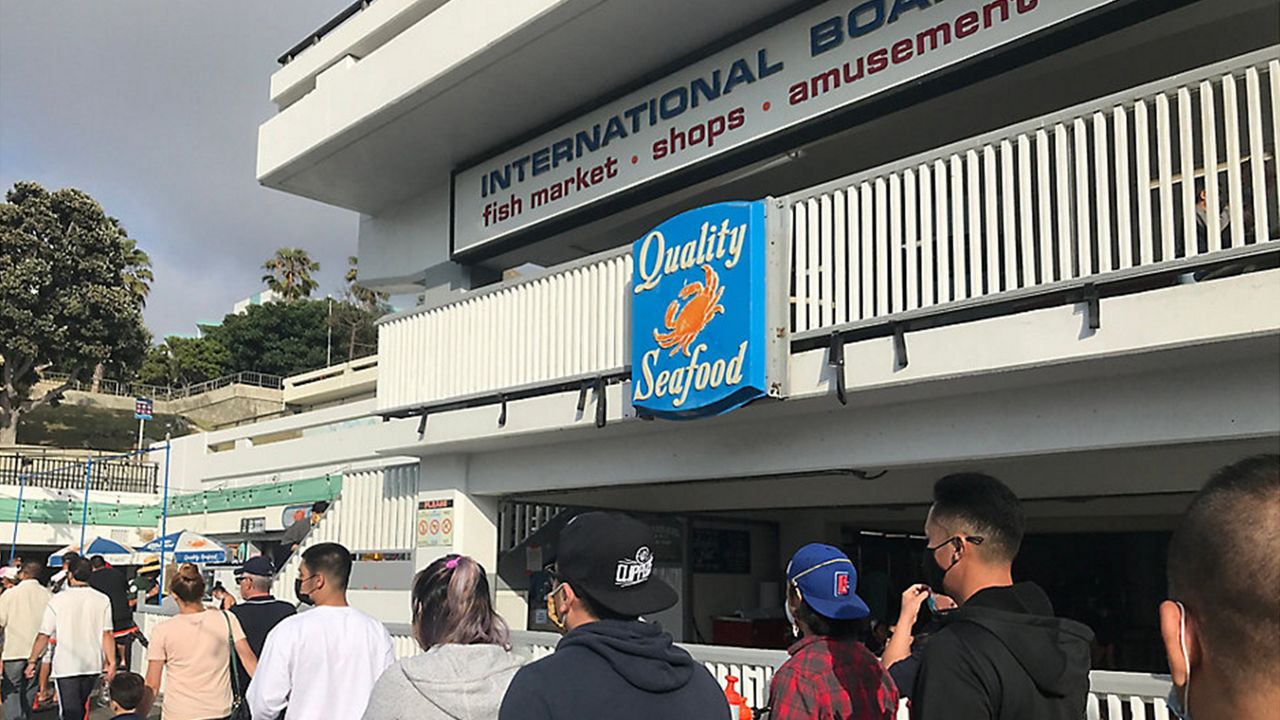In 1994, Jeff Jones first visited Quality Seafood, the business owned by his then-girlfriend’s family, and he was stunned to see that an outdoor fish market could be so busy.
“It was unbelievable the amount of people and energy there… it has that authentic, old school, California coastal vibe,” which Jones recognized from his youth in Santa Cruz — something he didn’t expect to find in a well-polished beach community like Redondo.
About five years ago, he was asked by his now-wife’s family to help run the business, which has stood in Redondo’s eclectic International Boardwalk since the ‘50s, and the market’s kept up its popular pace with its clientele.
Then the COVID-19 pandemic struck.
“It was brutal. We closed for about two and a half weeks, completely closed,” Jones said.
County regulations forced the city of Redondo Beach to close its municipal pier and adjacent parking early in the emergency, so even when businesses were able to adjust to public health recommendations, they were hamstrung. At least two businesses have told the city, which controls leasing in much of the pier and boardwalk area, that they’re closing for good.
For most of the last decade, Redondo Beach has slowly recollected the lease rights in the mile-and-a-half stretch encompassing its harbor and pier area as part of a master plan to become the “premier waterfront destination on the West Coast,” leaving the city as the landlord to dozens of businesses.
Redondo Beach now is facing a major budget shortfall, in part owing to pandemic-forced business closures. City staff estimates Redondo will lose as much as $5.5 million in waterfront-area rental revenue by July 2021.
Since closures began, the city has regularly met with its tenants to discuss rent deferrals. As of June 6, Redondo has negotiated with at least 39 businesses to determine who might need assistance.
“We’ve told them that we’ll add rent due to their account and when we see we’re on the other side of the crisis, we’ll sit down and come up with some sort of a payback program,” Waterfront and Economic Development Director Stephen Proud said. “We want them all to succeed. We don’t want them, just as they’re getting back, to try and come up with three or four months of deferred rent.”
Proud said he believes that the city is able to offer greater flexibility to its tenants as a landlord, versus commercial land owners who often have mortgages of their own they must pay.
South Bay commercial real estate agent Mo Sharifi, of Caskey and Caskey, has found that many high-end landlords have been able to offer similar deals to their tenants. But he’s also observed that many landlords, offering vacant commercial space, are not giving “COVID-19 discounts.”
“But we’re still going around this turn,” Sharifi said, referring to the pandemic. “We haven’t seen what’ll happen when we come out of it.”
By Proud’s count, only two businesses have closed along Redondo Beach’s International Boardwalk: Polly’s on the Pier, a locally-beloved breakfast spot that had recently relocated to the boardwalk; and Mystical Joy, a gift shop with a bent toward tarot readings, astrology, and crystals.
“I’ve closed at a huge loss, but I’ve been out of work for three months,” Joy Coradetti, Mystical Joy’s eponymous owner, said. She believes the city’s inability to redevelop the area has contributed to decline, but the pandemic was her business’s death knell.
“I wasn’t really ready to open a store with the pandemic still raging. For the people coming in, it’s very difficult to say ‘don’t touch.’ I had a lot of crystals and jewelry, and people are going to want to touch that,” Coradetti said. “My life was worth more than my store.”
For decades, Quality Seafood has stood as a cornerstone of the International Boardwalk. During the warm season, the snack bar and fish market will serve upward on 2,000 people — and on great days, it’ll top 3,000 customers.
The pandemic has left Quality Seafood’s revenues at about 80 percent of the restaurant and market’s typical performance for this time of year.
“Fish and seafood is the type of thing people don’t want to buy sight-unseen, and we weren’t allowed to have anyone in the business,” Jones said. “It looked grim. But we were able to work with the city on a way to navigate people safely through the market,” following similar models seen at Trader Joe’s or Whole Foods Markets grocery stores. Boardwalk businesses were also boosted when Redondo opened up pick-up-only parking, to navigate around other health restrictions.
As of June 8, Quality Seafood is open and providing limited dine-in service for its customers, using permits for seating just outside its regular dining area and within a short walk of the market. The city has reached out to most of its restaurant tenants to offer similar outdoor seating options.
What the market has missed, Jones notes, is its non-local customer base — Quality Seafood’s busiest days give credence to the area’s “international” moniker, as mariachis play to a roiling sea of diners from across Southern California. But business has started to ramp up again, even with social distancing protocols in place, leaving Jones cautiously optimistic.
“We’re trying to do right by the customer, from a health standpoint, but we’re trying to not get ahead of ourselves. We understand that things might regress, if the virus gets out of control and we get into the same predicament we were in before,” Jones said.



